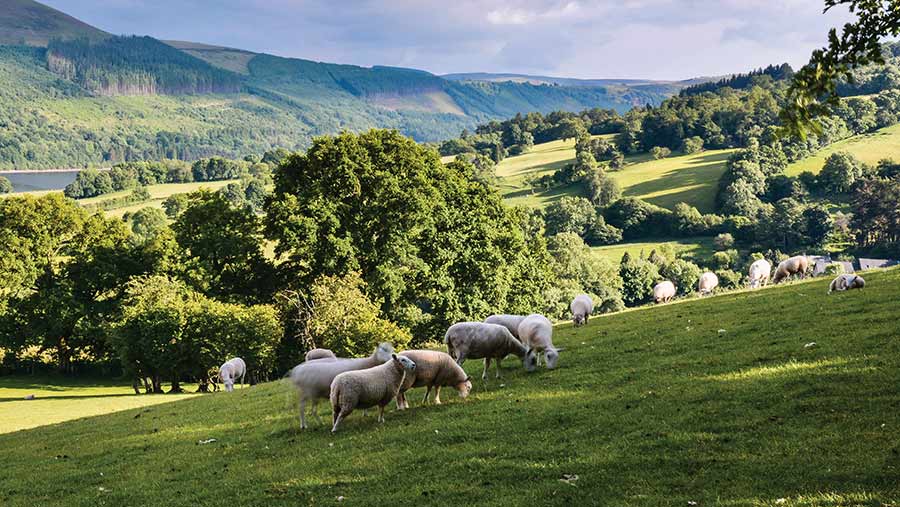How will new Welsh Agriculture Act affect farmers?
 © Zen light/AdobeStock
© Zen light/AdobeStock The debate and voting are over. All that now stands in the way of the Agriculture (Wales) Bill becoming legislation is royal assent.
Described by rural affairs minister Lesley Griffiths as the most important piece of agricultural legislation to go through the Welsh parliament in its 25 years of existence, it is expected to pass into law later this summer, making it an Act of Senedd Cymru.
Having left the EU, Wales had the freedom to design its own agricultural policy to replace the EU’s CAP. The question is, how will the new legislation shape the future direction of farming in Wales?
See also: New kit steals the show at Royal Highland 2023
Subsidy issues
The general approach is to remove direct payments by 2025 – farmers will continue to receive full Basic Payment Scheme (BPS) payments in 2023 and 2024.
The BPS makes up 80% of Welsh farm income and the government had initially planned to start phasing in a new funding regime from 2021.
But with the new Sustainable Farming Scheme (SFS) not expected to be ready until January 2025, it was forced to rethink its plans.
Under SFS, farmers and land managers will receive payments to farm in ways that promote environmental benefits such as water and soil quality and carbon storage.
The agriculture bill sets out a detailed framework for how this will happen.
Framework
The overall SFS framework is based on the principle of a “baseline payment” for all farmers undertaking what the government calls “universal” actions; they can then gain additional support for “optional” and “collaborative” actions.
The requirement for farmers to have at least 10% tree cover on their farm is seen by many as the most challenging of the universal actions – it has been described by the Farmers’ Union of Wales as “completely impractical or impossible for many farms”.
It is a particular issue for farms with a large percentage of habitat or coastal land, highly productive land and common land.
There are concerns for the tenanted sector, too, should landlords either retain the woodland themselves or not agree to a change of land use within the tenancy contract.
Opponents of this measure argue that the government should adopt alternative routes to achieve this environmental good – such as enhancing the 410m tonnes of organic carbon thought to be stored in Welsh soils, or allowing additional habitat land such as peatland to qualify for individual thresholds.
Income stability
NFU Cymru will also be pressing the government for the support scheme to have an “adequate stability element’’.
Its president, Aled Jones, says this is necessary as Welsh farmers adapt to new trading arrangements and the economic effects of new policies.
He also wants to see the SFS set up to provide “occasional support at times of wide-scale crisis”, for instance when there are animal and human disease outbreaks – the foot-and-mouth crisis and the Covid pandemic being cases in point.
The effect of geopolitical factors, such as the war in Ukraine, also need to be covered.
“Complementing this stability element must be a fair reward for environmental outcomes both in terms of what farmers have already delivered and what they will deliver into the future,” Mr Jones suggests.
This is an important point for many farmers who already have established environmental “goods” on their farms and are worried they will miss out on SFS payments that incentivise others to introduce these.
Other issues
From the moment the agriculture bill was introduced, farming unions have campaigned for the economic viability of agricultural businesses and family farms to be a clear objective, and the bill does now recognise this.
But the FUW said it was “disappointed” that amendments tabled to explicitly include support for new and young entrants were unsuccessful.
There are also aspects of the bill which set it apart from other UK nations – for example a complete ban on the use of snares and glue traps, which rural affairs minister Lesley Griffiths describes as “inhumane”.
It makes Wales the first country in the UK to do so.
But while the bill has been described as being “made-in-Wales, for Wales”, what the Welsh government doesn’t have complete control over is the budget. It will be Westminster that will continue to control the purse strings when it passes into law.
Bill amendments
As the bill made its passage through the Senedd, several amendments were tabled and agreed, including one at the 11th hour.
At the report stage in June, the Senedd voted in favour of changing one section which, had it not been amended, could have narrowed the financial support given to certain groups, including common-land graziers, because they don’t have full management control over the land.
Landowner concerns
But landowners’ organisation CLA Cymru is concerned that this amendment also gives farming tenants with farm business tenancies (FBTs) the power to go straight to arbitration to have the terms of their agreements altered.
Its senior policy adviser, Fraser McAuley, warns that it could result in the withdrawal of land from the tenanted sector in Wales and a subsequent reduction in farms offered for rent. “This measure undermines freedom of contract under the law for both parties: landowner and tenant,” he says.
“It will generate uncertainty and create a new and unnecessary deterrent for landowners to commit new land to longer-term tenancies. Such an arrangement would never be seen in other commercial arrangements.”
Tenancy deterrent
When terms which are already established can be changed mid-term, this may deter landowners from entering into longer-term tenancies, Mr McAuley adds.
Clarification is being sought from the Welsh government on whether this affects pre-existing contracts.
“As we transition to a new scheme for supporting and regulating agriculture in the next 24 months, this is not the time for the Welsh government to be creating insecurity,” says Mr McAuley.
